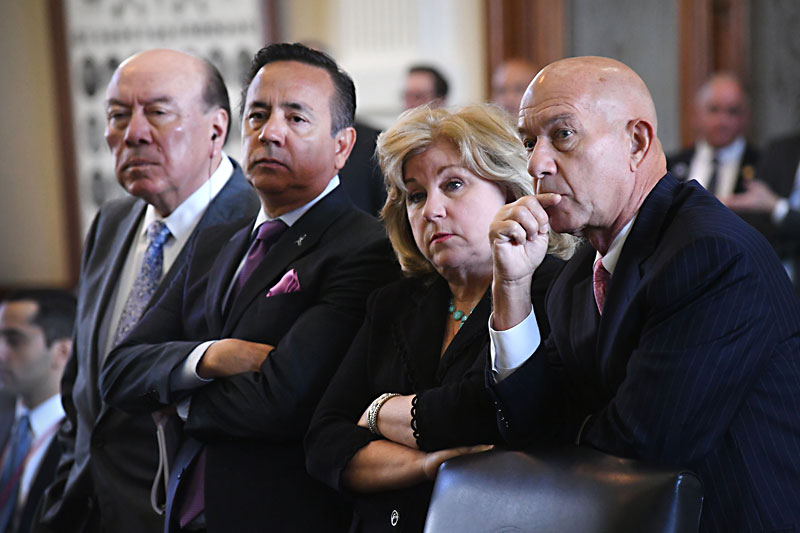Lege Lines: Stretching Toward a Sunset
Don’t praise the Senate GOP for working quickly to pass what’s needed
By Mary Tuma and Richard Whittaker, Fri., July 21, 2017

On Tuesday, the Texas Senate wasted no time fast-tracking the two vital bills that the Legislature failed to pass during regular session, the key reason Gov. Greg Abbott forced lawmakers to cut their summer plans short and return to Austin.
SB 20 and SB 60 extend the life of the Texas Medical Board and four other state agencies, which the Lege – specifically Lt. Gov. Dan Patrick, through his political obstinance – placed in danger of closing by 2019 during the regular session's slow fizzle to sine die in May. Patrick held the noncontroversial housekeeping hostage until the House passed a property tax reform bill and a discriminatory bill that barred transgender residents from using the restroom that matches their gender identity. When the House passed versions of both measures, Patrick decided they weren't extreme enough to fit his ideological vision, and so here we are again at the Capitol in mid-July.
Early on Tuesday, Sen. Kelly Hancock, R-North Richland Hills, requested the Senate suspend rules and usher along the sunset bills to the Senate Committee on Business & Commerce. Within roughly an hour of the 20-11 party-line vote, the committee unanimously passed the legislation. The full Senate gave the bills preliminary approval on Wednesday, shortly before this issue went to press. The legislation is expected to be heard on third and final reading at midnight on Thursday, July 20. Talk about lightning-fast.
On its face, speeding up the sunset bills sounds like a helpful and efficient move, but when you're talking about the Texas Senate, you can bet there's an ulterior motive. Here it is: The quicker the upper chamber passes sunset legislation, the sooner they can sink their teeth into the red-meat issues waiting on Abbott's 20-point call for the special session, including the anti-LGBTQ "bathroom bill," a handful of anti-abortion measures, and bills restricting local control. By Abbott's orders, the additional 19 proposals can only be brought up if the sunset bills pass. (Sorry, the Senate's stunning alacrity doesn't imply any progress.)
Senate Republicans also spent their first day back squashing rules that foster public participation. The move came as a blow to Dems, who, limited in power by sheer numbers, could have also used those rules as a time-stalling strategy. One rule permits a senator to "tag" a bill, giving senators 48 hours' advance written notice of the time and place set for a public hearing on a specific bill; another requires 24 hours' public notice of a committee hearing. Democrats decried the two suspensions as a threat to transparency and public engagement. "We are trying to move the people's business forward without the people's input," Sen. Sylvia Garcia, D-Houston, told her colleagues. Hancock, stopping short of completely admitting he opposed citizen input, argued that the public is apparently well aware of the sunset bills, and that moving fast is necessary.
Other senators pointed out that "tagging" has been in place since 1939 and the long-honored rule ensures full public input and examination of bills. In her three decades at the Capitol, Sen. Judith Zaffirini, D-Laredo, said she'd never witnessed anyone blocking the rule. (Patrick countered that it had occurred before – as far back as 50-70 years ago.) Sen. José Rodríguez, D-El Paso, who initially sought to tag SB 20, sounded off in a statement that called the retroactive tag suspension "unprecedented" and a rollback of senators' rights and public participation. "We have to acknowledge the elephant in the room," said Rodríguez. "This is the only bill that needs to pass this session, and there's plenty of time to do that in accordance with our normal rules. But those in control of the Capitol want to speed things up with this bill so they can get to the supplemental call."
Bingo. All that extra waiting time and citizen input would just slow things down, and that's not the name of the game for the Senate GOP, who are chomping at the bit to tear apart more of our basic constitutional rights. – Mary Tuma
Meanwhile, in the House …
State representatives spent the first day of this year's special session more focused on Nelson Mandela's achievements than any state-centric legislation piece.
Don't blame the House for that. The way Abbott assembled the special call, representatives had little to do on Tuesday morning. Nothing comes their way until the sunset bills pass through the Senate. So while the Senate speed-read through those provisions, the House occupied itself with busy work. Thus the reading and passage of House Resolution 34, recognizing Nelson Mandela International Day.
For the most part, the House floor had the demeanor of an office called in early from vacation to deal with some other department's business – which, in many ways, is exactly what they are. Loud "How was your vacation?"-style conversations bubbled throughout the chamber, forcing a constant drum of gavel-banging from the dais, and requests for members to come to order to dull the hubbub.
But don't confuse noise with inaction. The House, under Speaker Joe Straus, knows that it has no control over the agenda – that's been set by Abbott and Patrick, who have formulated the 19-point wish list from the Texas GOP platform's most conservative items, like attacks on local government and medical privacy. While their agenda will undoubtedly find supporters among some state reps, it's the Senate's baby. Abbott has repeatedly stated that he has no interest in a second special, meaning the House can just burn daylight until the time-limited special ends on Aug. 16.
So Tuesday was about positioning. By gaveling in at 10am, and out again prior to lunch, Straus sent a not-so-subtle message that the House will not be hurried. At the same time, his opening statement to members, welcoming them back for the next 30 days, seemingly put paid to hopes of an early end to business. Yet that also gives members plenty of time to file their own bills, countering or undercutting Abbott and Patrick's hard-line drafts.
The House conservative rump knows time is limited. That's why Rep. Tony Tinderholt, R-Arlington, filed HR 35, preventing a repeat of 2003, when Democrats decamped to Ardmore, Okla., to break quorum and kill a gerrymandering effort. He bemoaned from the back mic that his resolution had been sent, as is normal, to the Rules & Resolutions Committee under Chair Eddie Lucio III, D-Brownsville. How can a Democrat be trusted with this measure, he questioned, and what happens if he slows its passage? Straus retorted that he wouldn't deal with theoreticals.
Yet Abbott and Patrick's most dangerous opposition may not come from the floor, but from corporations like IBM, which have taken firm positions against the bathroom bill, among other pieces of anti-LGBTQ legislation. So Democrats held a press conference of strange bedfellows, with the Mexican American Legislative Caucus and the Texas Association of Business (traditionally the establishment voice of conservatives in commerce) standing in solidarity against not just the bathroom bill, but also Senate Bill 4, the "sanctuary cities" ban passed during the regular session. VisitDallas CEO Phillip Jones told the room that Texas had already lost $66 million in convention bookings and an estimated 38,000 hotel nights because of SB 4. If the Legislature moves ahead with transgender bathroom regulation, there'd be an estimated $1.5 billion on the line.
Which raises the question: How does it feel for MALC Chair Rep. Rafael Anchia, D-Dallas, to be able to call the Republicans anti-business? "Delicious," he said, while warning that it showed how far the GOP's right is prepared to indulge bigots come primary season. "They've run out of ways to pander to the most radical elements of their base, and as a result we're back here."
However, SB 4's passage showed Democrats they cannot count on House Republicans to hold the line. If measures like the bathroom bill pass, Anchia warns they will face the same court challenges as they currently are on SB 4. "Thankfully, we have a U.S. Constitution and a Texas Constitution that serve as some kind of check on these Republican fantasies," he said. – Richard Whittaker
Got something to say on the subject? Send a letter to the editor.











